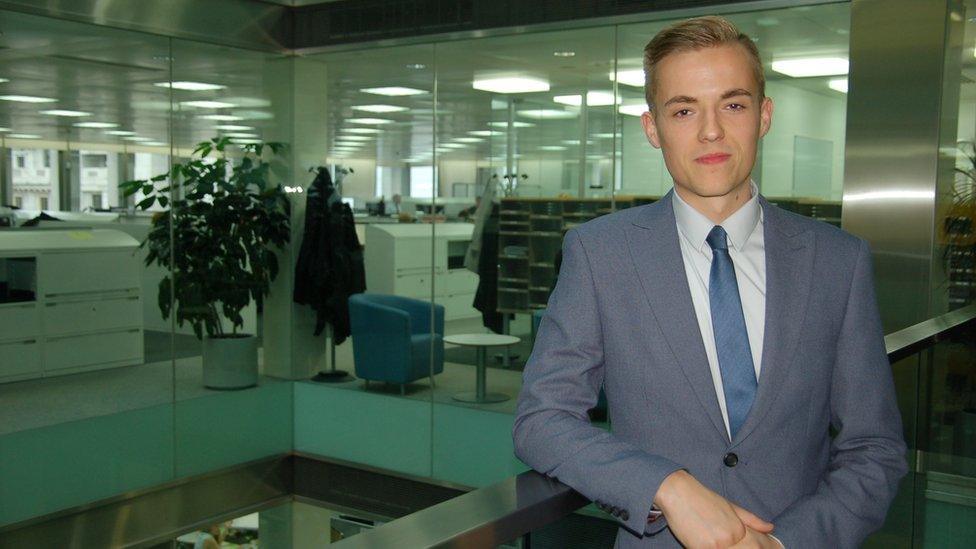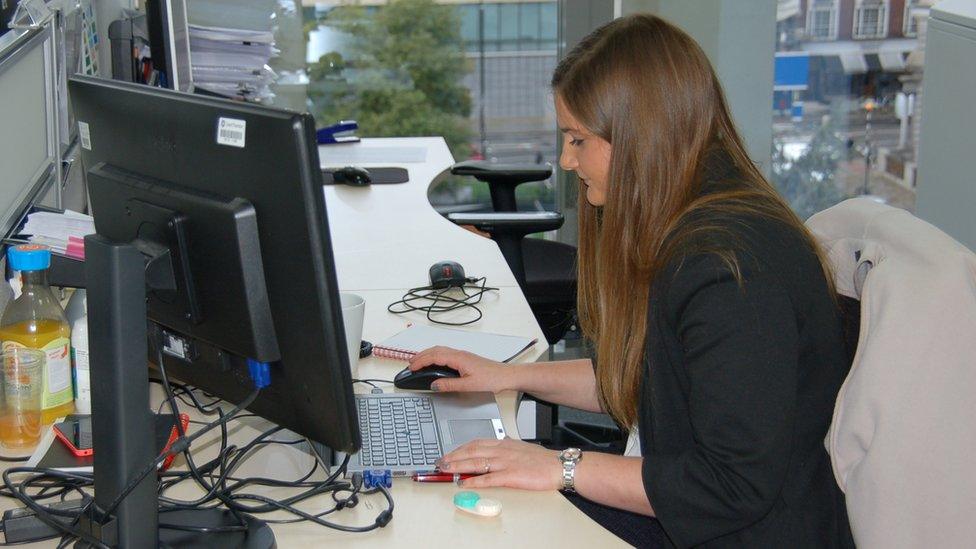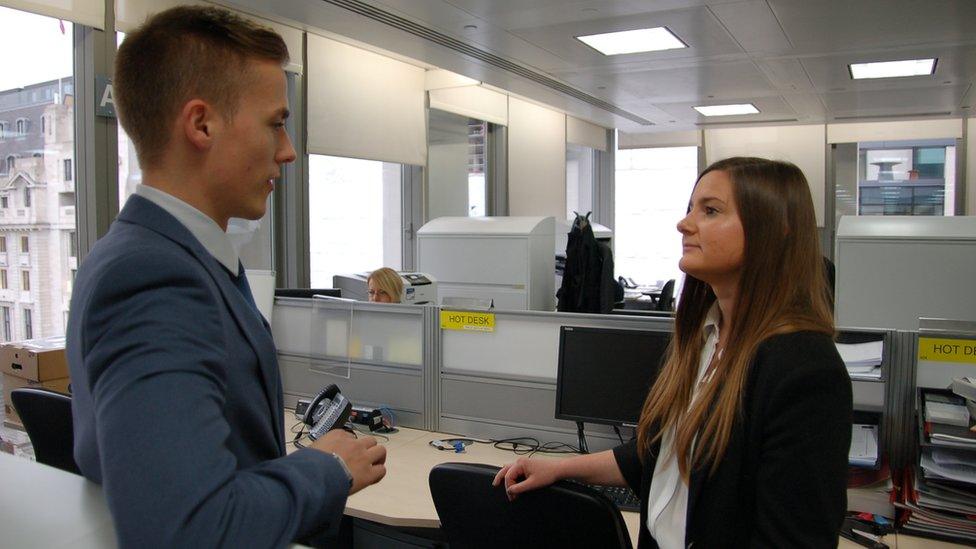How one city firm looked beyond poor exam grades and found talent
- Published

Former police officer Nick Aldridge joined Grant Thornton's training scheme in August
Exam disasters need no longer mean career calamity after a flurry of top companies announced plans to look beyond academic results. The aim is to tap into a wider talent pool. But will it work? One city firm made the change two years ago.
Nick Aldridge, 23, was a police constable until he joined city accountants Grant Thornton at the end of August as a graduate trainee, specialising in tax.
"I finished on the Friday at Northamptonshire Police and started here on the Monday," he says.
Nick got the job against heavy odds. Last year, the company's training schemes had 10,000 applicants for 500 places.
Despite a 2:1 degree, his A-level grades ruled him out of most top accountancy companies.
Most still require at least the equivalent of three Bs at A-level before they will even consider applicants for trainee posts, either at school-leaver or graduate level. Nick's A-level grades were a B and two Cs.
'Pioneers'
Since 2013, Grant Thornton has relied instead on a series of timed online tests and interviews to whittle the applicants down to a shortlist of about 800 for a final interview.
Applicants are scored on their personal and professional achievements, exam grades and on whether recruiters think they would suit the company's culture.
"We regard ourselves as pioneers," says senior talent and resourcing manager Richard Waite.

Lisa Newland was among the first school leavers to join the company under the new system
Overall, some 20% of this year's trainees are people the company would never have considered under the old system.
A series of other top companies have followed suit, but they are still a minority - a factor that left Nick "depressed" once he had made the decision to change careers.
"I felt trapped when I was still in the police," he says. "I was looking for a job in accountancy but they were restricted by the grade requirements.
"I even phoned up companies and explained what I was doing - but they said unless you meet the requirements you won't even get through the first stage."
Screened out
Mr Waite says he too found the old system frustrating.
At school and university careers fairs, he was frequently convinced he had met young people who would fit perfectly with the company's "down-to earth" culture, only to to be disappointed when they told him their grades.
"Instinctively I knew as a recruiter these people would have been great, but our process was screening them out," he says.
"What this is about is hiring the best people. Historically that meant people with a certain academic profile, but some great employees don't fit that profile.
"We want to tap into pools of talent we have not necessarily tapped before."

The company took on 500 graduate and school leaver trainees this year
Lisa Newland, 22, is part of this talent pool. She got great GCSE grades but found A-levels "heavy going", got herself a part-time job in a jeweller's and admits she had a bit too much of a good time instead of concentrating on her school work.
Her A-level grades, two Cs and a D, were disappointing.
She could still have gone to university "but probably not the universities I had in mind at the time".
"I went to have a look, traipsed my mum and dad all round the country, and then decided it wasn't for me," she says.
Instead, she took a clerical job with a smaller accountancy company, commuting to Moorgate daily from her home in Essex for three years.
She applied to Grant Thornton's Accelerate Scheme for School Leavers and is now training as a restructuring and recovery specialist for companies in difficulties.
Tough training
Qualifying as a chartered business adviser or accountant takes four to five years for a school leaver and three years for a graduate.
Exam preparation must be done on top of working full time.
So will people with weaker academic records cope? Lisa admits having been nervous.
"I thought, 'I am going into four years of exams, having not studied for three years, particularly with the grades I got,'" she says.
So far, however, she has passed them all.
"I am a lot more mature than I was three years ago," she says.
"This was what I wanted to do, so I make sure I am putting the effort to pass them. Obviously it was challenging, but I have not had a problem."
She describes the company as supportive, providing her with time to study if she needs it.
"We build in workshops and revision classes at weekends and evenings," Mr Waite confirms.
"It's also thought sensible to give people dedicated time out of their day jobs to prepare for exams," he adds.
He describes the company as "industry leading" in terms of exam pass rates.
Client relationships
A few weeks into his new career, Nick is positive about the change, despite being apprehensive about the exams
He says he often "dreaded... the extreme workload and general lack of support" of life as a police officer.

The company wants staff with good business knowledge who can maintain strong client relationships
Getting the new job "felt like a massive weight had been lifted".
"There are huge differences," he says.
"The general relationship between seniors and the juniors that are starting out is much more positive, even though the hierarchy is there.
"You get a lot more support. Now, I generally look forward to being in work."
Mr Waite says the new approach feels right for the company.
"I believe we have got a much more interesting cohort of trainees," he says.
"So you hire people who have interesting stories and interesting backgrounds and are really high performing in many other parts lives, that in previous years we wouldn't have given them the opportunity to tell us about even.
"I think part of being a great business adviser is about being able to grow and maintain really strong and deep client relationships, which is on an equal footing with the technical understanding that comes with being a business adviser.
"I think the people we are hiring now are able to do both well."
- Published29 September 2015

- Published3 August 2015

- Published4 May 2015
